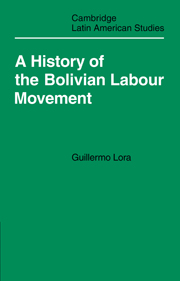Book contents
- Frontmatter
- Contents
- Editor's introduction
- Book 1 Protection versus free trade
- Book 2 Mineowners, artisans and Utopian socialists
- Book 3 Workers and the Liberal Party 1900–20
- Book 4 The nineteen-twenties
- Book 5 From the Chaco defeat to the Catavi massacre 1932–42
- Book 6 The workers become revolutionary
- Book 7 The rise and fall of the Central Obrera Boliviana
- Book 8 The military versus the unions
- Notes
- Editor's suggested reading
- Index
Book 5 - From the Chaco defeat to the Catavi massacre 1932–42
Published online by Cambridge University Press: 07 September 2010
- Frontmatter
- Contents
- Editor's introduction
- Book 1 Protection versus free trade
- Book 2 Mineowners, artisans and Utopian socialists
- Book 3 Workers and the Liberal Party 1900–20
- Book 4 The nineteen-twenties
- Book 5 From the Chaco defeat to the Catavi massacre 1932–42
- Book 6 The workers become revolutionary
- Book 7 The rise and fall of the Central Obrera Boliviana
- Book 8 The military versus the unions
- Notes
- Editor's suggested reading
- Index
Summary
From military defeat to ‘Military Socialism’
After the Chaco War the petty bourgeoisie almost effortlessly assumed control of the labour movement. The war had elevated the middle classes to a position of primary importance in the country's political life and they had been radicalised by the mobilisation for war. As a result of this new situation the pre-war attempts by the workers to set up class-based political organisations suffered a setback. In the immediate post-war period the independent socialist movement lost ground. The working class in general became alienated from politics, with the result that the workers' parties either found themselves isolated or else, in order to survive, joined up with petty-bourgeois groups and parties and soon became absorbed by the so-called state-socialist party which supported successive military régimes.
Once again intellectuals and students revived the claim that they had some special right to lead the masses, a course which always results in the workers sacrificing themselves for interests other than their own. Since almost all the Marxist union leaders were in exile, the unions tended to lose their class ideology and become dominated by chauvinist ideas. Thus, for example, remaining labour leaders organised the Confederación de Trabajadores de Bolivia in January 1935 and on 1 May 1935 (six weeks before the end of the war) issued a May Day manifesto which scarcely differed from the declarations of the dominant classes:
Bolivia, represented by the mass of her workers, has never placed any obstacles in the path of peace and, indeed, a fair-minded peace will be welcomed.[…]
- Type
- Chapter
- Information
- A History of the Bolivian Labour Movement 1848–1971 , pp. 169 - 213Publisher: Cambridge University PressPrint publication year: 1977



